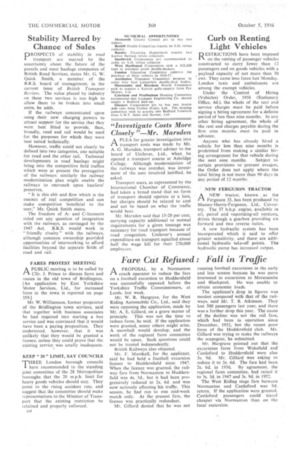Stability Marred by Chance of Sales
Page 44

If you've noticed an error in this article please click here to report it so we can fix it.
PROSPECTS of stability in road transport are marred by the uncertainty about the future of the parcels and meat haulage companies of British Road Services, states Mr. G. W. Quick Smith, a member of the B.R.S. board of management, in the current issue of British Transport Review. The value placed by industry on these two services is too high to allow them to be broken into small units, he adds.
If the railways concentrated upon using their new charging powers to attract support for the service that they were best fitted to provide, then, broadly, road and rail would be used for the purposes for which they were best suited technically.
However, traffic could not clearly be defined into two Categories, one suitable for road and the other rail. Technical developments in road haulage might bring into the competitive field traffics which were at present the prerogative of the railways: similarly the railway modernization plan might enable the railways to encroach upon hauliers' preserves.
" It is this ebb and flow which is the essence of real competition and can make competition beneficial to the user," Mr. Quick Smith states.
The freedom of Aand C-licensees ruled out any question of integration with the railways, as envisaged by the 1947 Act. B.R.S. would work in " friendly rivalry" with the railways, although common ownership provided opportunities of interworking to afford . facilities beyond the separate fields of road and rail.
FARES PROTEST MEETING
A PUBLIC meeting is to be called by Clir. J. Prince to discuss fares and routes in the old town of Bridlington. [An application by East Yorkshire Motor Services, Ltd., for increased fares in the town is reported on page 359.]
Mr. W. Williamson, former proprietor of the Bridlington town services, said that together with business associates he had inquired into starting a bus service and was convinced that it would have been a paying proposition. They understood, however, that it was unlikely that they would be granted a licence, unless they could prove that the existing service was totally inadequate.
KEEP " 20 " LIMIT, SAY COUNCILS THREE London borough councils I have recommended to the standing joint committee of the 28 Metropolitan boroughs that the 20 m.p.h. limit for heavy goods vehicles should stay. They point to the rising accident rate, and suggest that the committee should make representations to the Minister of Transport that the existing restriction be retained and properly enforced.
114
















































































































